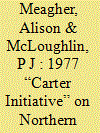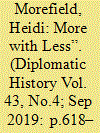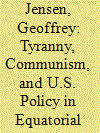|
|
|
Sort Order |
|
|
|
Items / Page
|
|
|
|
|
|
|
| Srl | Item |
| 1 |
ID:
167839


|
|
|
|
|
| Summary/Abstract |
Scholars have extensively documented the vital role of the Clinton administration in the early stages of the Northern Ireland peace process.1 However, Clinton’s intervention in Northern Ireland was not the first by a U.S. president. That came two decades earlier, with the Carter administration. Carter’s brief foray into Northern Ireland politics was obviously more limited than Clinton’s lengthy engagement, and is also less celebrated. This is understandable given the direct role that Clinton, and more particularly his envoy to Northern Ireland, Senator George Mitchell, played in brokering the 1998 Good Friday Agreement (GFA), which underpins the peaceful settlement that the region still enjoys today. But in some ways Carter’s role can be seen as more significant than, or certainly foundational to, Clinton’s efforts. Carter’s intervention came during the Cold War, which had an indirect effect on Northern Ireland.2 Despite significant agitation from Irish America, successive U.S. administrations refused to comment on Northern Ireland, deeming it a purely internal affair—and often a matter of considerable international embarrassment—of the British government, Washington’s key ally in a Cold War context.
|
|
|
|
|
|
|
|
|
|
|
|
|
|
|
|
| 2 |
ID:
167836


|
|
|
|
|
| Summary/Abstract |
On a bright and breezy October day near the end of the Great War, an imperious Quaker woman in a gray corduroy suit sat in her family home in Mt. Kisco, New York, and wrote a short note to her denomination’s fledgling “Service Committee.”1 She had a “concern,” she said—not especially for her fellow Americans or for any of the Allies, but for the notorious “Huns” whom the world blamed for the horrors of the Great War. “For the past two or three years I have felt a concern for service among the people in Germany,” the woman, Carolena Morris Wood, wrote on October 15, 1918. “As the opportunity for such service seems to be approaching I write to volunteer under your leadership. I believe that Friends have, awaiting them in that country, an important service in spiritual healing and reconstruction.”2 A member of the Religious Society of Friends (Quakers), Wood felt called to be a friend to the friendless. And Germany in 1918 was truly a forsaken country, a byword for suicidal imperialism at the dawn of a democratic age.
|
|
|
|
|
|
|
|
|
|
|
|
|
|
|
|
| 3 |
ID:
167838


|
|
|
|
|
| Summary/Abstract |
On a wet Wednesday morning in November 1940, an audience of academics, journalists, policymakers, business leaders, and military men crowded a Columbia University auditorium for a discussion on “The Bases for an American Defense Policy” at the Academy of Political Science’s annual meeting.1 The first speaker, imperial and diplomatic historian Edward Mead Earle, opened on a contrarian note and questioned the session’s title. The term “defense” was “misleading,” Earle began. It designated a policy of “sitting back and waiting until the enemy is at one’s gates. Perhaps a better word to use is security.” For only with “security” could “the initiative … be ours, and only by taking the initiative, only by being prepared, if necessary, to wage war offensively, can we … make sure that defense is more than a phrase and is in fact a reality.” Earle’s co-panelists continued to use “defense,” but soon “national security” would be on the tip of all their tongues, as the United States pivoted from a policy of national defense to one of national security.2 This was more than a semantic shift. National security heralded a novel way of imagining the world, one in which a permanently prepared United States would confront seemingly omnipresent threats. It marked the re-thinking and re-making of U.S. power abroad and at home.
|
|
|
|
|
|
|
|
|
|
|
|
|
|
|
|
| 4 |
ID:
167841


|
|
|
|
|
| Summary/Abstract |
In December 1923, the Japanese Emergency Earthquake Relief Bureau [Rinji shinsai kyūgo jimukyoku] (EERB) took an action that could have been diplomatically disastrous: It sold flour and wheat.1 These commodities were not ordinary bags of agricultural sustenance, but rather humanitarian relief supplies donated by the United States following Japan’s most deadly and destructive natural disaster of the modern era. Months earlier, knowledge that Soviet officials had sold grain overseas while receiving relief supplies from the American Relief Administration (ARA) so vexed Commerce Secretary Herbert Hoover that he terminated assistance provided under the Russia Famine Relief Act of 1921. No such reprisal occurred against Japan. Rather, American officials both in Japan and the United States pre-emptively defended Japan’s decision to sell donated goods and suggested it was guided by “common sense.”
|
|
|
|
|
|
|
|
|
|
|
|
|
|
|
|
| 5 |
ID:
167837


|
|
|
|
|
| Summary/Abstract |
In the aftermath of the 1970s, the United States’ foreign assistance program posed a particular challenge to free-market policymakers. For Peter McPherson, senior consultant to the presidential campaign of then-Governor Ronald Reagan in the spring of 1980, the question of how to optimize aid would be crucial to rethinking U.S. bilateralism. In a report envisioning “A Cheaper and More Effective Foreign Aid Program,” he argued that “the U.S. foreign aid program should be changed to emphasize self-help and technology transfer rather than resource transfer. Studies have shown a higher ‘rate of return’ for ‘investments’ in the self-help/technology transfer programs.” The change in emphasis, McPherson continued, would be consistent with the emerging ideology of Reaganism, although the presidential hopeful should still be “sensitive to the fact that U.S. business provides most of the goods included in resource transfers.”
|
|
|
|
|
|
|
|
|
|
|
|
|
|
|
|
| 6 |
ID:
167840


|
|
|
|
|
| Summary/Abstract |
This study of Washington’s dealings with Equatorial Guinea under the rule of one of modern Africa’s most brutal dictators, Francisco Macías Nguema, analyzes US perceptions and policies relating to communist intervention, human rights, and related geopolitical issues during the Nixon, Ford, and Carter presidencies. It also sheds light on the relationships and conflicts between the Soviet Union, China, and Cuba in Africa. In addition, it offers new perspectives on Cuba’s close ties to the dictatorship of Francisco Macías Nguema and on the possible role of international actors in his downfall in 1979.
|
|
|
|
|
|
|
|
|
|
|
|
|
|
|
|
|
|
|
|
|